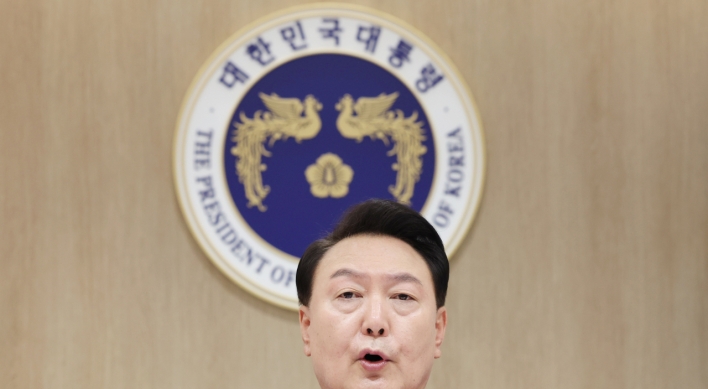[Editorial] Mature attitude to history
Japan must look back at past, accept reasonable demands over historical truths
By Korea HeraldPublished : Jan. 11, 2018 - 17:29
The government ended controversies over whether to renegotiate the 2015 agreement on World War II era sex slaves with an effective nullification of it.
It said the issue regarding Korean women taken into sexual slavery for wartime Japanese troops cannot be settled by the accord, but decided not to try to renegotiate it. The government, however, decided not to tap the 1 billion yen ($9 million) Japan put into a South Korean foundation for the victims under the accord, and also urged a heartfelt apology.
Though controversies over the accord came to an awkward end, the government made practically the best, and an inevitable, choice considering bilateral relations.
The problem is Japan.
President Moon Jae-in repeated his demand for an apology at a New Year’s news conference Wednesday, but Japan said it would not accept any additional demands regarding the “final and irrevocable” agreement. The government in Tokyo also vowed to keep demanding the South Korean government comply with the accord as is. Prime Minister Shinzo Abe reportedly decided to put on hold his decision to attend the opening ceremony of the PyeongChang Olympic Games in South Korea next month.
Tokyo is putting pressure on South Korea over the accord, but for the future of Korea-Japan relations, it should look back to its past and ponder why the deal faces opposition and backlash.
Japan raises issue with South Korea’s decision to replace the 1 billion yen with its own funds and rejects its demand for a sincere apology, but such responses are excessive in view of historical truths on the victims it euphemistically calls “comfort women.”
Japan apparently gives much meaning to its contribution as a key part in settling the issue finally and irreversibly, but glosses over the essence of the problem. Japan must know it is not the dispensation of funds but compensation that acknowledges its legal responsibility that former comfort women have demanded incessantly. In view of their wishes, the decision to replace Japan’s contribution with governmental funds is significant in its own way.
If Japan wants to be respected in the international community as a country that does not turn away from history, the government in Tokyo must heed reasonable calls for a proper settlement. As Moon and Foreign Minister Kang Kyung-wha have repeated, what the victims want is a heartfelt apology, among other measures.
The demand for a sincere apology for horrible wartime violations of women’s rights cannot be more justified. Historical truths cannot be buried finally and irrevocably.
The Moon administration has given up on trying to renegotiate the deal despite criticisms of his failure to keep a campaign pledge for the sake of maintaining bilateral ties and international faith in South Korea. But Japan rejected even the minimum demand for an apology to the victims, insisting it wouldn’t budge an inch.
Of course, arguments that a promise is a promise are not wrong. But whether Japan for its part complies with the accord properly is questionable as far as it rejects demands for a sincere apology. It cannot say it has done all it should.
Probably Japan is as well aware of issues regarding the ideal as South Korea is. It is not in a position to reject a fair demand for an apology flatly. Tokyo needs to take note of the fact that the history of comfort women has become a universal human rights issue of wartime sexual violence against women.
In anyone’s book, Tokyo’s tenacity in emphasizing the finality of the deal will be seen as a move intended to conceal what it wants to for good. It is not the right attitude toward history. Now is the time to show a mature attitude toward historical truths.
Turning back to the Moon administration, it understandably made a practical choice, but it needs to ask itself whether it has dealt with the accord issue smoothly. It raised expectations it would seek to renegotiate the agreement. One cannot but ask why it made such a big fuss. It must listen humbly and attentively to criticisms of its decision and try to figure out follow-up measures more prudently.
-
Articles by Korea Herald



















